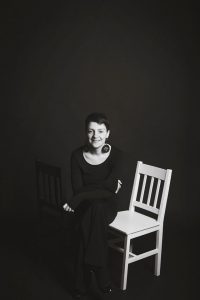The Aesthetics of Performativity in the Pianistic Practice of the 21st Century
Doctoral student: Marta Finkelštein
Supervisors: Prof. Petras Geniušas, Assoc. Prof. Dr. Lina Navickaitė-Martinelli
Department: Piano
Intended duration: 2017–2021
Abstract
Performative work of art creates new identity, new form of subjectivity.
(Audronė Žukauskaitė)
The term of performativity was introduced in the middle of the 20th century by the linguist John Langshaw Austin and opened space for alternative thinking. As Austin categorized constative language that depicts concrete actions and the performative language that expresses symbolic meanings that are relevant only to social group related by specific cultural grounds, he opened the possibility to think of the events contextually – to take into account social, political and historical circumstances. The technology-driven multicultural times, when all the art has become part of a global market, this theory gives us tools to search for a new logic and meaning in the field of art. A theory does influence the practice and a practice influences the theory: pieces of art gradually become more political and contextual. There is a growing need for new critical thought: “performance theorists need to seek a ‘live‘, a performative, creative and critical discourse for analyzing performance that enhances its ephemeral qualities, instead of trying to pin it down in conventional academic or journalistic prose” (Phelan 1997). The studies by E.F. Lichte (2004) and H.T. Lehmann (1999) are the significant examples of creative and critical discourses and will provide the analytical methods to investigate the contemporary music phenomenon and address the new challenges of the work in contemporary music field.
In the context of contemporary art, the curatorial thought became an essential ingredient for a well-shaped presentation. Curators and artists in their practices very consciously choose the elements of suggested narrative linked by specific social, historical or cultural links. In my artistic practice as a soloist and director of Contemporary Music Ensemble Synaesthesis, I feel the growing need to create artistic performances that would be conceptually strong and unanimous. In my artistic research project, I will suggest the idea of performer/curator as an extended professional competence for modern musicians. The main concentration in my work will be focused on the programming alternatives that would be formed consciously and with a specific concept in mind.


